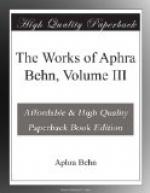The
Author dreads the strut and meen
Of new prais’d Poets,
having often seen
Some of his Fellows, who have
writ before,
When Nel has danc’d
her Jig, steal to the Door,
Hear the Pit clap, and with
conceit of that
Swell, and believe themselves
the Lord knows what.
Thus at the end of Lacy’s The Old Troop (31 July, 1668), we have ’a dance of two hobby horses in armour, and a Jig.’ Also shortly before the epilogue in Shadwell’s The Sullen Lovers (1668) we read, ’Enter a Boy in the habit of Pugenello and traverses the stage, takes his chair and sits down, then dances a Jig.’
But it must be remembered that beside the common meaning there was a gloss upon the word derived from Elizabethan stage practice. In the prologue to The Fair Maid of the Inn (licensed 1626), good plays are spoken of as often scurvily treated, whilst
A Jigge shall be clapt at,
and every rhime
Prais’d and applauded
by a clam’rous chyme.
The Pre-Restoration Jig was little other indeed than a ballad opera in embryo lasting about twenty-five minutes and given as an after-piece. It was a rhymed farce in which the dialogue was sung or chanted by the characters to popular ballad tunes. But after the Restoration the Jig assumed a new and more serious complexion, and came eventually to be dovetailed with the play itself, instead of being given at the fag end of the entertainment. Mr. W.J. Lawrence, the well-known theatrical authority to whom I owe much valuable information contained in this note, would (doubtless correctly) attribute the innovation to Stapylton and Edward Howard, both of whom dealt pretty freely in these Jigs. Stapylton has in Act v of The Slighted Maid (1663) a ’Song in Dialogue’ between Aurora and Phoebus with a chorus of Cyclops, which met with some terrible parody in The Rehearsal (cf. the present editor’s edition of The Rehearsal, p. 145). Indeed all extrinsic songs in dialogue, however serious the theme, were considered ‘Jigs’. A striking example would be the Song of the Spirits in Dryden’s Tyrannic Love, Act iv.
In Post-Restoration days a ballad sung in the streets by two persons was frequently called a Jig, presumably because it was a ‘song in dialogue’. Numerous examples are to be found amongst the Roxburgh Ballads.
The Jig introduced in Sir Timothy Tawdrey would seem to have been the simple dance although not improbably an epithalamium was also sung.
p. 44 an Entry. A dance which derived its name from being performed at that point in a masque when new actors appeared. In Crowne’s The Country Wit (1675) Act iii, I, there is a rather stupid play on this sense of the word confounded with its meaning ‘a hall or lobby’.
p. 63 Cracking. Prostitution. A rare substantive, although ‘Crack’, whence it is derived, was common, cf. p. 93 and note.




